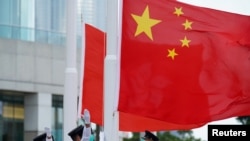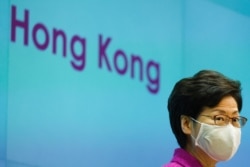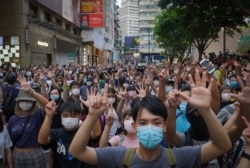China's top legislative body has formally announced plans to change Hong Kong's electoral system to ensure that only "patriots" will govern the island.
No other details of the plans have been made public.
Chinese State Councilor Wang Yi last week said the move is "necessary for a brighter future" in the city, while Hong Kong Chief Executive Carrie Lam said the city's postponed legislative elections could be delayed even further due to the electoral changes.
The proposed changes are expected to grant more voting power to pro-Beijing members of the 1,200-member electoral commission that selects Hong Kong's chief executive. The changes would strip the voting rights of several lower-level district councilors, many of whom are pro-democracy supporters.
The changes would ensure the Hong Kong legislature is filled strictly with "patriots," a term used last month by Xia Baolong, director of the Hong Kong and Macao Affairs Office of the State Council.
The Asian financial hub was rocked by massive anti-government protests in the last half of 2019, triggered by outrage over a controversial extradition bill that evolved into a demand for democracy. The semi-autonomous city had been a British territory until 1997 when it reverted to China with a promise that its way of life would be maintained.
Since then, Beijing has tightened its grip on Hong Kong, from the detention of booksellers by mainland security agents to the expulsion of a foreign journalist, the jailing of young activists and curbs on electoral freedom.
The demonstrations, which directly challenged the government, spurred Beijing to impose a new national security law last year under which anyone in Hong Kong believed to be carrying out terrorism, separatism, subversion of state power or collusion with foreign forces could be tried and face life in prison if convicted.
While Beijing says it will establish "a democratic electoral system with Hong Kong characteristics," critics say the changes will exclude most anti-China, pro-democracy legislators from future electoral races and will likely turn Hong Kong into a fake democracy.
Chien-Yuan Tseng, chairman of the Taipei-based think tank New School for Democracy and an associate professor at Chung Hua University in Taiwan, told VOA Mandarin that the changes highlight the presence of Beijing loyalists in the most important roles in local politics.
In accordance with the Hong Kong Basic Law, any changes to Hong Kong's electoral system should involve a decision from the Hong Kong people, Tseng said, "Yet we know nothing about the text of this reform. The Hong Kong citizens are kept in dark."
"The move deprives Hong Kong people of their rights. It violates the Hong Kong Basic Law, as well as Article 31 of the Chinese Constitution," he added.
Article 31 sets up Hong Kong as a special administrative region and makes it clear that the Basic Law holds sway in the territory.
"This is tyranny of the majority. Dissidents will have no avenues to voice their opinions," he continued, "I believe this will only provoke a backlash, letting anyone with a different opinion with Beijing to gather together and form a political power, which might impact the island's long-term stability."
A Chinese academic who asked not to be identified told VOA that since the passing of the National Security Law, Hong Kong has been under "One Country, One System."
"The current Chinese authorities believe that no matter (if) it's 'One Country, Two Systems' or 'One Country, One System,' the essence is CCP (Chinese Communist Party) leadership," he said. "Only by following the CCP can one be called a patriot. So, love your country equals to love the party equals to obey the orders by the party."
Thousands of Hong Kongers have left the island since Beijing imposed the National Security Law last July.
Newly released figures from Taiwan's National Immigration Agency show that 10,813 Hong Kongers were granted residency permits in 2020, almost double the previous year's total.
Australia, Canada and the United States have opened new immigration routes for Hong Kong residents. Britain, the island's former colonial overlord, has invited holders of British National (Overseas) (BN(O)) passports to apply for a new type of visa that establishes a path to citizenship.
Official estimates say that within five years, as many as 1 million Hong Kongers will leave, according to The Guardian newspaper.
"Hong Kong is now the same as China," the Chinese academic said. "But I hope once day, people at both places can enjoy freedom."
VOA's Lin Yang contributed to this report.









